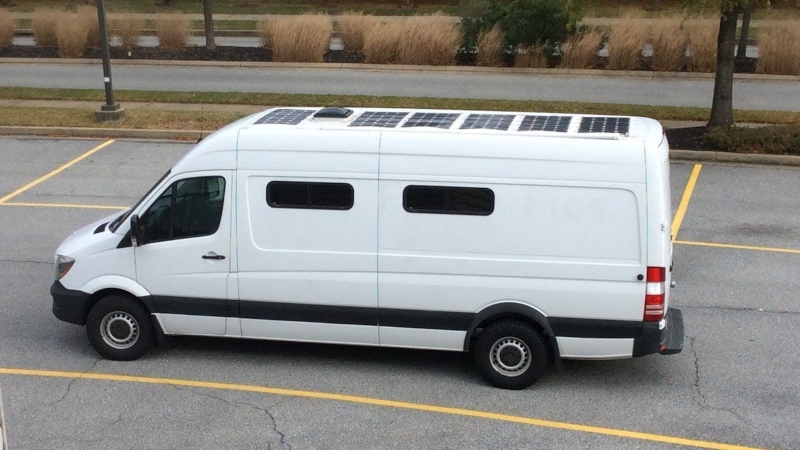Thanks for your support! If you make a purchase using our links in this article, we may make a commission. And, as an Amazon Associate, I earn from qualifying purchases. See the full disclosure here.
A stealth camper van for off-grid living is an amazing way to disconnect and be self-sufficient. But just what is a stealth camper van? And what’s the best choice for one?
A stealth camper van is a Class B motorhome designed to look like a normal cargo van or other work vehicles. You can camp almost anywhere because people don’t suspect them to be camper vans. You can make a self-contained camper van for off-grid living with components like a solar power system, a freshwater tank, and other features.
So which van should you use for your stealth camper van for off-grid living? Let’s take a look at the 5 best stealth vans and everything you’ll need to know to live off the grid.
5 Best Stealth Camper Vans for Living Off-Grid
Here are the five best stealth camper vans for living off-grid or “stealth camping”.
1. Mercedes-Benz Sprinter
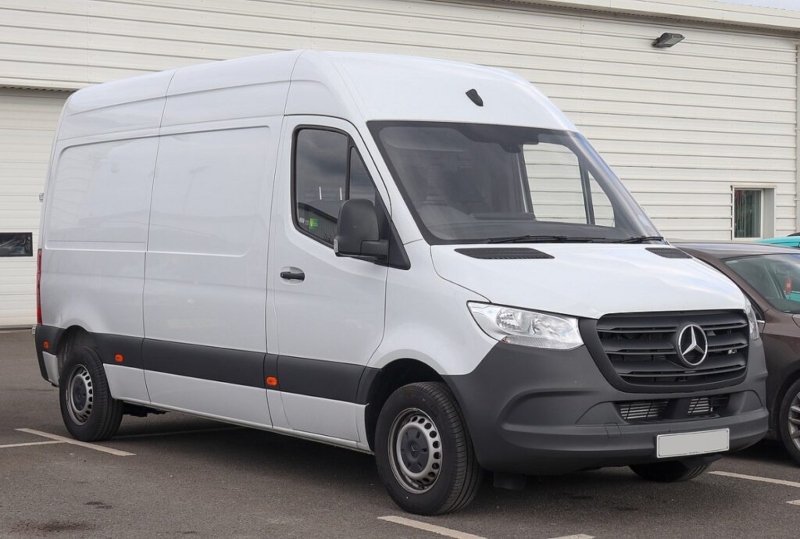
- Models: 1500, 2500, 3500, 3500XD, 4500
- Length: 19.46 ft. – 24.17 ft.
- Engine: 2.0L I4 turbo-gas/ 2.0L I4 turbo-diesel/ 3.6L V6 turbo-diesel
- Fuel: 22 gal gas/ 24.5 gal diesel
- Payload: 3,682 lbs – 6,735 lbs
- Cargo Space: 319 cu ft. – 533 cu. ft.
The Mercedes-Benz Sprinter has long been a gold standard for camper vans – and for a good reason. It sports great gas mileage, gas or diesel engine options, an optional 4×4 drive train, and is a highly reliable van.
RVBlogger News Tip: Per a Mercedes-Benz announcement, the 2023 Sprinter will no longer have the V6 engine option. Instead, you can choose between three different 4-cylinder engines. A gasser and two diesels. One of the diesel engines will have a single turbo, and the other will have dual turbos to increase horsepower and torque. Regardless of the engine, each will now come with a nine-speed transmission (adding 2 more gears) and will be fully all-wheel-drive.
The Mercedes Sprinter has become one of the best-selling cargo vans in the U.S. It’s used for personal, commercial, and industrial applications. People use it for mobile offices, shuttles, delivery vans, and mobile construction tool sheds, to name a few.
In fact, once you know to look for them, you’ll see Sprinters everywhere. They likely won’t think twice when someone sees your Sprinter stealth camper van. You’ll be hiding in plain sight with these popular camper vans.
2. Dodge Ram ProMaster
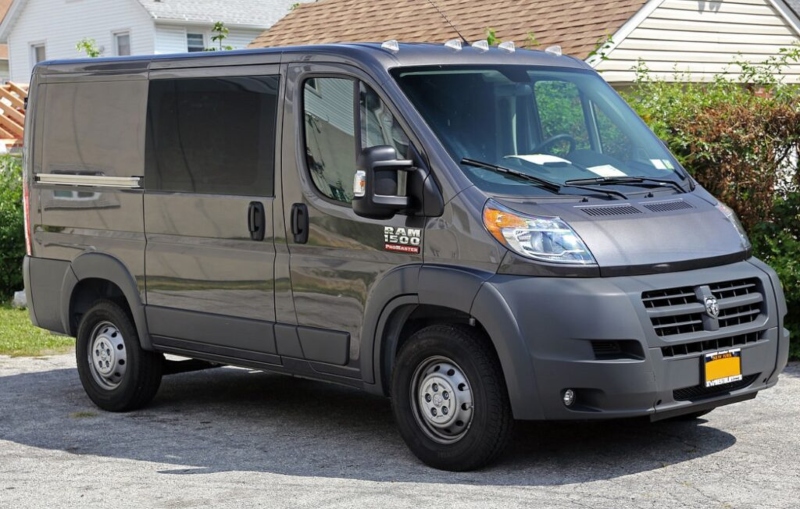
- Models: 1500, 2500, 3500
- Length: 16.28 ft. – 20.88 ft
- Engine: 3.6L V6 gas engine
- Fuel: 24 gal
- Payload: 3,760 lbs – 4,680 lbs
- Cargo Space: 304 cu. ft. – 463 cu. ft.
Dodge Ram ProMaster is the name used in the US and Canada for the Fiat Ducato. It’s not totally French since the North American ProMaster uses a Chrysler chassis, engine, transmission, and other components. There are a lot of great features that make it a great camper van for off-grid living.
For one, the ProMaster is the only cargo van that comes standard with front-wheel drive. This has several advantages, including:
- FWD can provide more traction, especially going up hills or in slippery conditions
- This drivetrain style usually has fewer components than other drivetrains, creating a lighter vehicle
- FWD is typically cheaper to maintain
When Mercedes separated from Chrysler in 2007, the American engineers learned a lot from their German counterparts. Fiat’s influence has also made the ProMaster a great van for DIY stealth camper van builds. You’ll find that the frame, floor, and roof construction are specifically designed to hold the structural supports for the various features you want to add to your van build.
3. Ford Transit
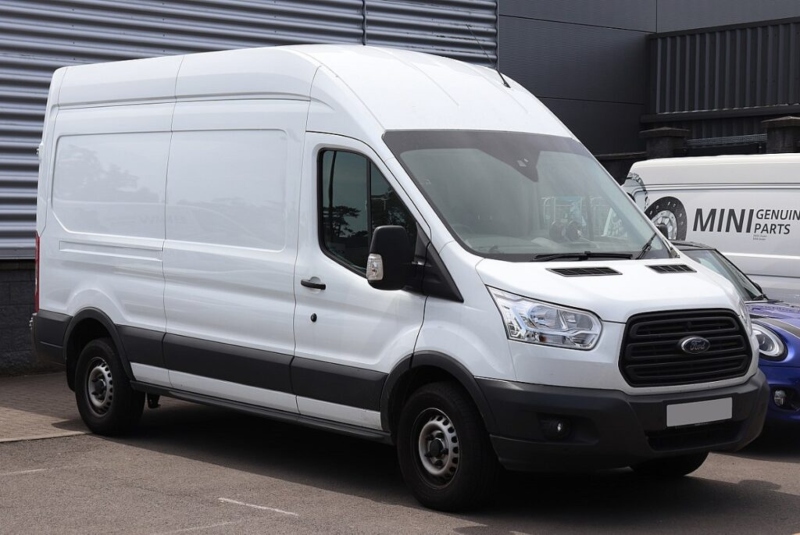
- Models: T-150, T-250, T-350, T-350HD DRW
- Length: 18.33 ft – 22 ft.
- Engine: 3.5L PFDI V6 PFDI gas/ 3.5L V6 EcoBoost gas/ 2.0L I4 turbo-diesel (pre-2021)
- Fuel: 25 gal standard, 31 gal optional
- Payload: 3,060 lbs – 5,110 lbs
- Cargo Space: 246.7 cu. ft. – 487.3 cu. ft.
The Ford Transit is an increasingly popular option as a stealth camper van for off-grid living.
The Transit is a reliable, high-quality van with many great features. Plus, it has the highest roof available in a cargo van, so it’s a great option if you need extra headroom. Because it’s a Ford, you’ll never have a problem with parts, maintenance, or repairs.
The Transit is also available with AWD, which is great if you want to do some lighter off-roading. As of 2021, Ford discontinued the 2-liter diesel engine, but you can still find used versions.
If you look at the traditional RV Industry, you’ll notice that the Class B plus and compact Class C motorhomes use the Ford Transit for heavier models. This should raise a green flag in your mind telling you that the Transit does well with a heavier camper van build. If you plan to load your stealth camper van up with every possible feature, this van may be what you want.
4. Chevrolet Express/GMC Savana
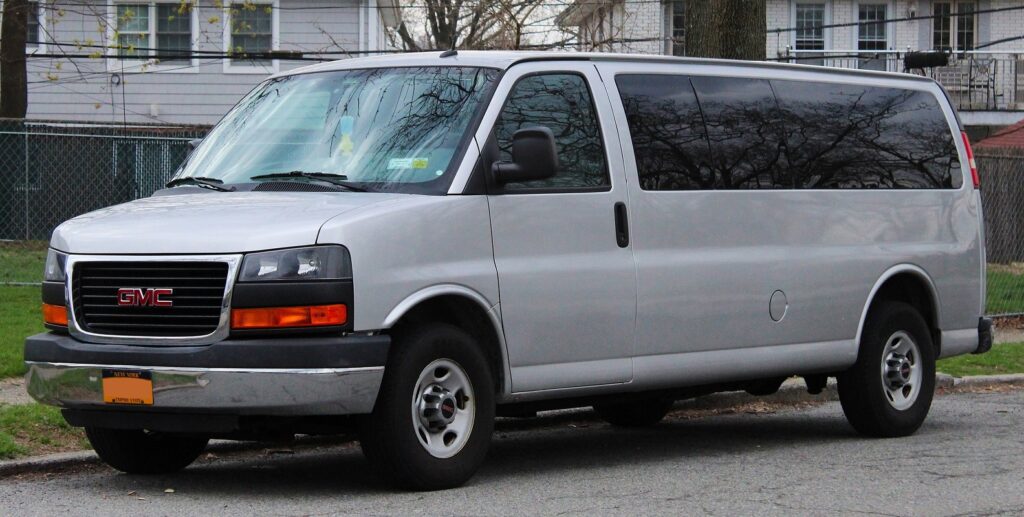
- Models: 2500, 3500
- Length: 18.6 ft. – 20.3 ft.
- Engine: 4.3L V6 gas/ 6.6L V8 gas/ 2.8L I4 Duramax turbo-diesel
- Fuel: 31 gal
- Payload: 2,715lbs – 3,673 lbs
- Space: 218.5 cu. ft. – 255.5 cu. ft.
Although they have different names, the Chevrolet Express and the GMC Savana are the same van. Whatever badge you have on the front, it’s a great choice for a stealth camper van for off-grid living.
Older Chevrolet Express or GMC Savana vans can be found at great prices. They’re regarded as highly reliable and durable. Plus, parts and maintenance are fairly affordable. Because they’re still enough of them on the road, they won’t draw much attention. They look more like a work vehicle, so they don’t warrant a second look.
The Express/Savana has an American-style body with a lower roof but wider interior space. Unless you install an aftermarket pop-top, you’ll eventually get used to moving around in the “crouching walk” technique. But those few extra inches of width can give you a longer bed, a wider center aisle, and other benefits the European-style vans don’t have. Look what Fern did with her 2006 Chevy Express in the Movie Nomadland.
5. Medium Duty Box Truck
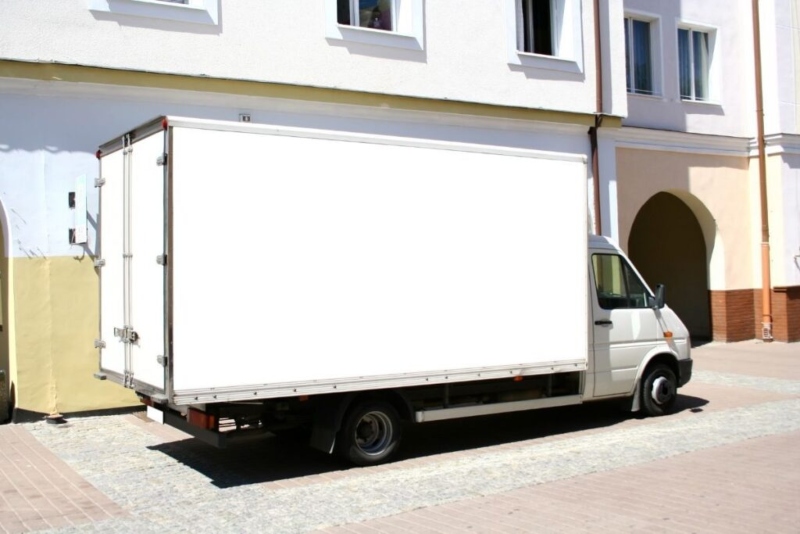
When you think of a stealth camper, you probably think of a full-size cargo van. But have you ever considered a box truck camper?
Also known as box vans, these are chassis cab trucks (think a pickup without the bed). They have a large rectangular storage area that’s usually separate from the cab. A common example is moving trucks, like those used by UHaul and Penske. Frequently, these are built on the same chassis as popular cargo vans, such as the Ford E-Series chassis.
Box trucks provide a lot of room, and their straight walls and barebones construction make them easy to convert into a camper. They can also carry an average of 10,000 pounds, so the added weight of your van build won’t be much of an issue. In most states, a Commercial Driver’s License (CDL) is for vehicles over 26,000 pounds and/or used for commercial reasons.
Because they’re not nearly as common as cargo van conversions, box truck conversions have an easy time blending into the background. Very few people see a box truck and suspect there’s anyone living inside.
- Brands: Chevy, Ford, Freightliner, GMC, Hino, International, Isuzu, Kenworth, Mack, Mitsubishi, Nissan, Peterbilt, Dodge Ram, and Western Star
- Length: typically 10 to 26 feet
- Engine: Manufacturer’s brand or Cummins
- Fuel: typically 20 to 31+ gallons
- Payload: Average capacity is 10,000 lbs.
- Cargo Space: Average of 1,700 cu. ft.
1. 20 Best Van Conversion Companies by Region
2. 5 Most Fuel Efficient Campervans
3. 10 Best Vans For Your Camper Van Conversion
4. How Much Does Van Life Cost Per Month?
5. 25 Must-Have Campervan Accessories
4 Features Most Important Camper Van for Living Off-Grid
You’ll need some specific things if you want to build a camper van for off-grid living.
1. Source of Electricity
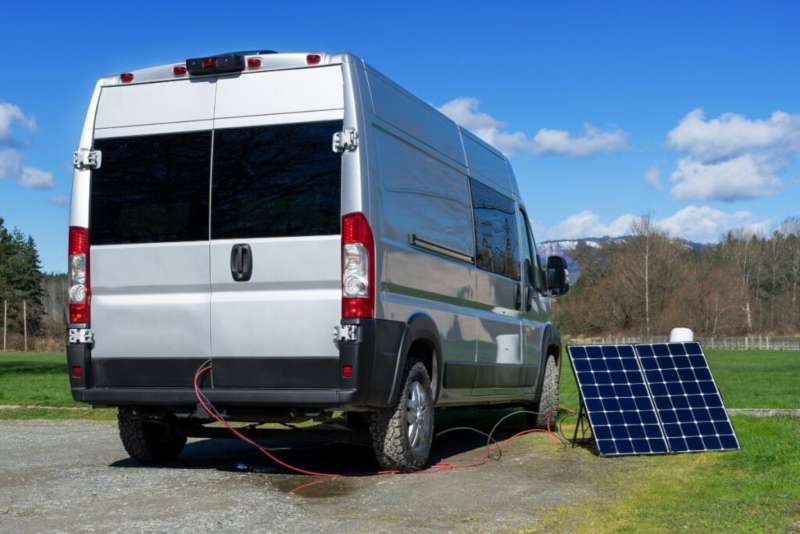
You’ll need electricity to run lights, a refrigerator, and electronic devices. The simplest way to get electricity is with a gas generator.
Gas generators can provide power on-demand using propane or gasoline. But they have a lot of downsides. They’re loud, heavy, need proper ventilation, and require you to have a sufficient supply of fuel on hand.
The other option is solar power. This is a lot more involved and can have a high start-up cost. You’ll need to install solar panels, a decent-sized battery bank, and plenty of other equipment to run the whole system.
There are many upsides if you have the patience, research skills, good with your hands, and have a budget for at least a small solar system kit. Once installed, a solar system is quiet, low maintenance, and creates eco-friendly power. Compared to other power generation sources, solar is slow and only keeps your batteries charged. All of the electronics run off the house batteries.
If you want solar power without the hassle of installation, you can also try a solar generator. These are basically all the parts of a solar system, excluding the panel, in one relatively small package. You have to connect a solar panel or alternative power source, charge the generator, and run everything off of the generator itself.
2. Large Water Tank
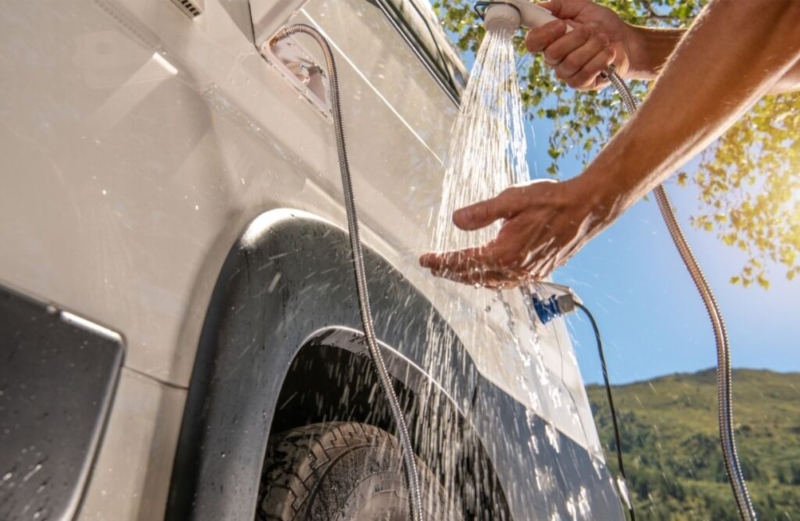
You need water to live, so you’ll want to make sure you have enough for off-grid living. While there are methods that let you collect your own water supply, such as rain barrels, these aren’t really feasible for most van lifers.
Instead, you’ll need to bring your water supply with you, and you’ll need plenty of it. Having the largest freshwater tank possible and/or even supplementing with extra tanks is a good idea if you want to go off-grid.
RV water tanks come in many different shapes and sizes. Companies even make water tanks that fit around your camper van’s wheel wells. RV freshwater tanks that fit in stealth camper vans for off-grid living generally have a rectangular shape, so it’s easy to build cabinetry around them.
3. Places to Store & Prepare Food
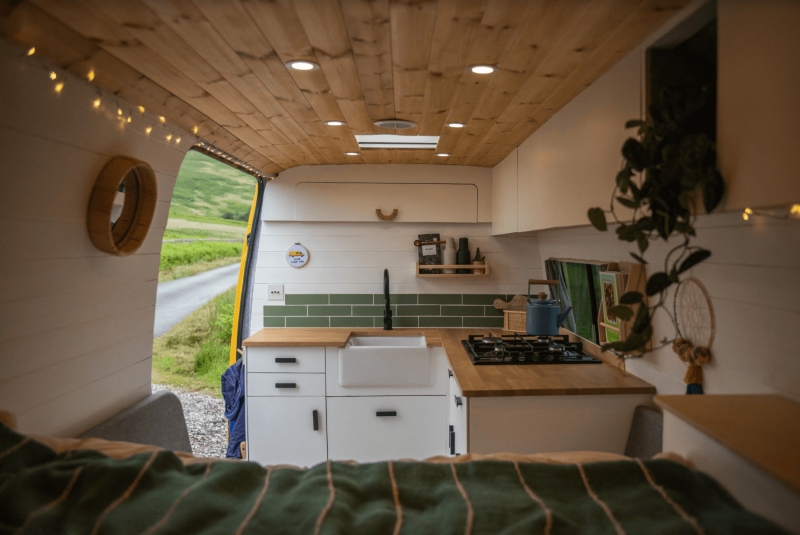
Everyone’s gotta eat! So you’ll need to consider where you’ll store food and how you’ll prepare it.
You’ll need an RV refrigerator if you want to store anything besides canned goods and other nonperishables. This can be powered off your camper van’s house batteries, a generator, or propane.
You can use either traditional door RV refrigerators or space-saving chest-style versions. They come in 2-way, 3-way, all-electric, or 12v DC powered. Like RV freshwater tanks, RV fridges can be built around. Need additional surface space, the top of a chest-style fridge on sliders makes a good RV workspace.
You’ll also need to cook your food. You can always use a campfire to cook in remote locations, but propane and electric stoves are good options. If you use one of these, make sure to account for the LP or electric use.
4. Waste Management and Hygiene
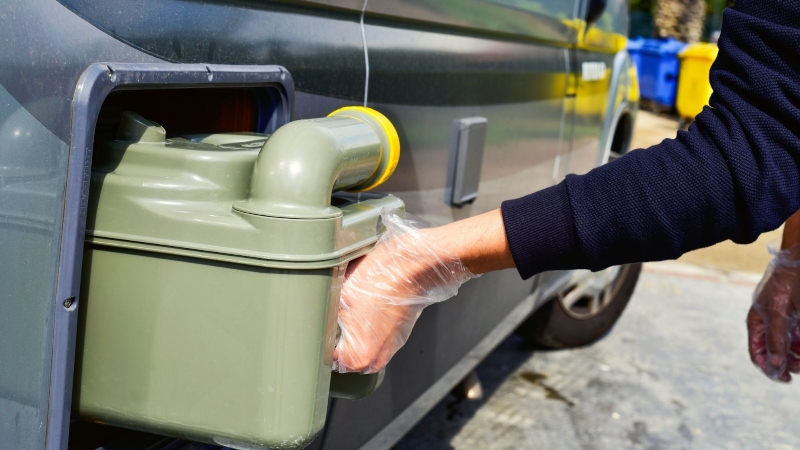
You’ll need to keep clean as well as store and dispose of waste while off-grid.
An easy way to keep clean is a portable camping shower. These use a water bag or pump placed in a bucket of water. A shower head gives you enough water for a quick soap-and-rinse experience. Portable camping showers consume little to no electricity. Depending on where you are off-grid, you might need to heat the water on your stove, or some models use solar heat.
Managing your waste is also another consideration. If your camper has a toilet that empties into a black water tank or cassette, you’ll need to know how long you can stay off-grid before finding an RV dump station. In this case, it helps to plan your off-grid RV adventures to include cycling the water holding tanks.
However, waste disposal is much easier if you have a composting toilet. Composting toilets must be dumped at the proper compost dumping locations. The Bureau of Land Management (BLM) instructions on digging a hole are for single use only. When you’re in the middle of nowhere and can’t get to a toilet in time. Paying a fine for illegal dumping isn’t a campfire story you want to share.
If you’re in an urban or suburban area, you can also use gyms for bathing facilities. Rest areas and public parks have trash cans and restroom facilities too.
What Qualifies as Off the Grid?
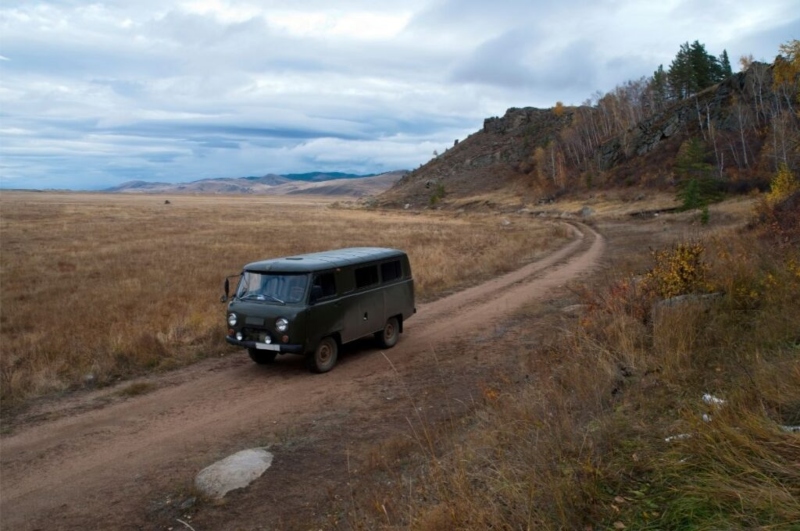
What qualifies as “off the grid”? Off-grid living generally refers to living without a connection to public or campground utilities, but it can have slightly different meanings for different people.
“off the grid” refers to the electrical grid in the strictest sense. Living off the grid means you aren’t taking any electricity from municipal power sources. The only power you use is generated by the equipment on your RV.
There are some that go a step further by forgoing all public utilities such as water, gas, and sewer utilities. This could include going without communication services such as telephone and internet.
Some take living off-grid to the extreme by giving up any utility services. If they can’t carry it with them, they don’t need it. You’ll see this primitive living style of camping in the #TentLife, basic teardrop campers, or some stealth camper vans for living off-grid without plumbing or electrical features. Those with basic van conversions where the third-row bench converts into a bed may live the primitive RV lifestyle.
Of course, those that choose the #VanLife want some modern technology. For most van lifers, off-grid living means having the choice of disconnecting from the world from time to time.
How Long Can You Live Off-Grid in a Campervan?
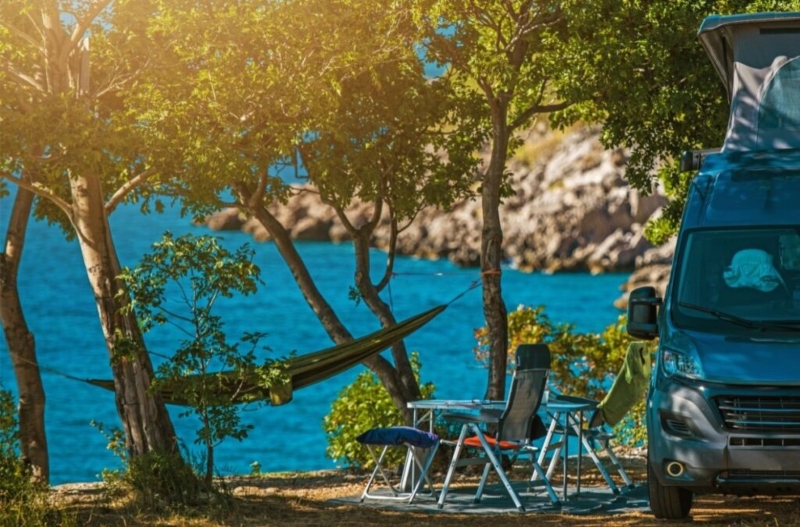
How long you can live off the grid in your van depends on various factors.
For one, how long can your supply of food and water last? How long will that fuel supply last if you’re using a gas generator or anything else requiring fuel?
These will be major deciding factors on how long you can stay off-grid. The simplest answer to “how long can I stay off the grid” is: “until your food, water, and fuel runs out.” For most people, this will be just a week. Maybe two weeks with careful planning, rationing, and large holding tanks.
However, if you’re especially self-sufficient, you may be able to stay off-grid for a month or more. You can keep yourself going by making supply runs to dump stations, grocery stores, fuel stations, and other places throughout your stealth camper van off-grid adventures. Use apps to find the best places to minimize the pit stop times and costs to keep you going.
Maybe even spending a night at a small campground can be advantageous for cycling your tanks, getting a real shower, and giving your generators a break by using shore power. Think about it; a whole night of air conditioning, your favorite movie, a clean body, and pizza delivery. During a weeknight with a camping club discount program, it could be your “glamper” night!
City Living in a Stealth Camper Van
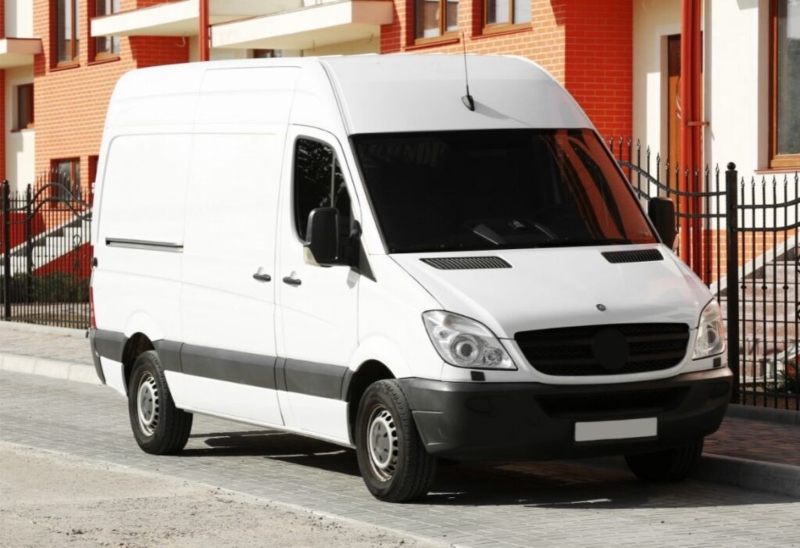
In a city, there are a few practices you should follow to keep yourself from getting in any trouble for stealth camping.
One of the biggest things is keeping light and noise to a minimum. Avoid keeping your lights on if you can, and consider using red or purple LED lights that aren’t as bright. Blacking out any windows will keep light from showing and provide privacy.
You should also avoid making too much noise. Avoid loud music or TV (consider using headphones) and talk with your best indoor voice.
Another important thing is to never stay in the same place two nights in a row. Make sure to vary your spot each night and avoid repeating spots. You should also try to arrive after dark and leave early in the morning to reduce the chances of somebody noticing you.
Good places to park for the night include parking lots in public parks and parking lots at big box stores like Walmart. In fact, at Walmarts and some other stores, you don’t even need to be stealthy.
You’ll also want to learn about the city or county laws regarding sleeping in your vehicle at night. Some of them are cracking down on crime and homelessness within their borders. You may want to avoid these areas and choose the next town over. Also, keep your camper van in good shape. The better its appearance, the less likely the police will come knocking.
A Stealth Camper Van for Off-Grid Living is a Great Way to Get Away From it All
A stealth camper van for off-grid living has a lot of perks. With the self-sufficiency they give you, you can truly unplug and get away from it all. Plus, because a stealth camper looks just like normal cargo vans, you can camp even in big cities.
To live off the grid, you’ll want a way to generate electricity, sufficient water storage, and a way to store and prepare your food. Unless you have a composting toilet, you’ll want the biggest waste tank possible.
Properly outfitted, your stealth camper van for off-grid living will give you freedom and independence that’s hard to beat. Now you have all the knowledge you need to pick the right van for you!
1. 7 Best Fridges For Van Life
2. 5 Best Roof Racks for Van Life
3. Best Air Conditioners for a Camper Van
4. Best Campervan Window Covers for Summer and Winter
5. Best Campervan Rental Companies: US and Canada
About the author:
Jennifer and Kendall are avid RVers and part-time van lifers who share their years of experience both as full-time RVers and nomads through writing.
Jenn and Kendall have explored Canada, the USA, and Mexico while RVing and living full-time in all 3 countries.
They have been fortunate to work not only as part of the RVBlogger team but also with RVLife, DIY RV, Camper Report, RV Magazine, Rootless Living, Vanlifers, and more.
They have also shared their RV experience through DashboardDrifters.com and are the founders of RVSpotDrop, a web service for full-time RVers.


